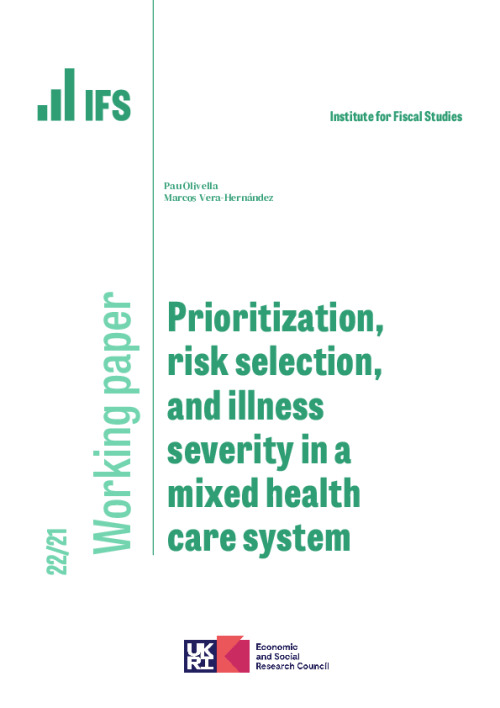Downloads
We study the link between illness severity and the use of public health care services by the privately insured under a public health system. Our theoretical model shows that this relationship will depend on the prioritization established by the public health authorities, the cost of waiting and the private sector's risk selection behavior. In our empirical exercise, based on the British Household Panel Survey data, we find the consistent pattern that both the most severe cases and the least severe cases are more likely to be treated under the public system, leading to a U-shaped relationship between severity and public use. As our theoretical model points out, this is not necessarily a consequence of risk selection by private health providers, but it could be just a consequence of prioritization by the public sector.
Authors

Research Fellow University College London
Marcos is a Research Fellow at IFS, an Affiliate at the Rural Education Action Program and a Professor of Economics at the University College London.

Pau Olivella
Working Paper details
- DOI
- 10.1920/wp.ifs.2022.2122
- Publisher
- Institute for Fiscal Studies
Suggested citation
Olivella, P and Vera-Hernandez, M. (2022). Prioritization, risk selection, and illness severity in a mixed health care system. London: Institute for Fiscal Studies. Available at: https://ifs.org.uk/publications/prioritization-risk-selection-and-illness-severity-mixed-health-care-system (accessed: 30 June 2024).
More from IFS
Understand this issue

Cuts to council services likely unless cost pressures abate – even with the biggest council tax increases for 20 years
21 June 2024

Election Special: The UK economy since 2008
3 June 2024

If you can’t see it, you can’t be it: role models influence female junior doctors’ choice of medical specialty
24 April 2024
Policy analysis

How should we interpret parties’ public spending pledges this election?
23 June 2024

Main parties’ manifestos tell us little about the funding individual public services would actually receive
23 June 2024

How do the last five years measure up on levelling up?
19 June 2024
Academic research

The role of hospital networks in individual mortality
13 May 2024

Forced displacement, mental health, and child development: Evidence from Rohingya refugees
10 May 2024

A senior doctor like me: Gender match and occupational choice
24 April 2024
